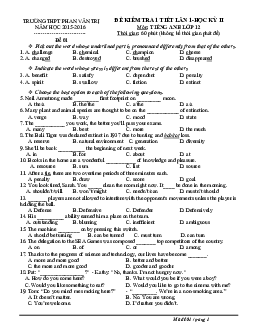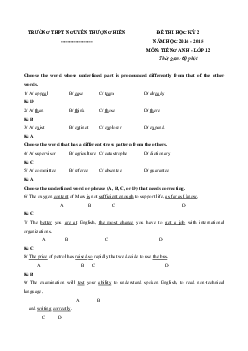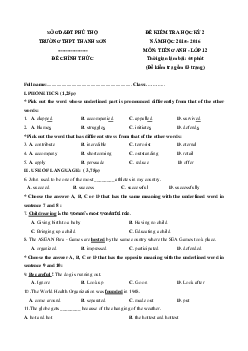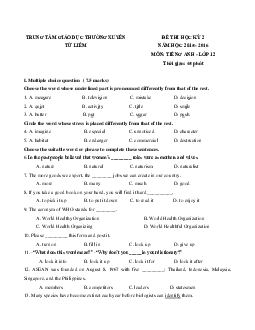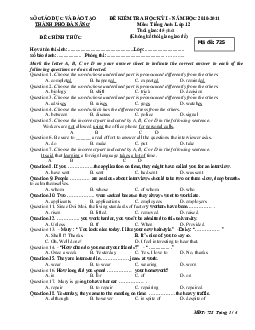





Preview text:
Đề thi học kỳ 2 môn Tiếng Anh lớp 12 có đáp án
Choose the word which is stressed differently from the rest. 1. a. establish b. educate c. regional d. operate 2. a. labor b. country c. promote d. women 3. a. represent b. intensive c. domestic d. employment 4. a. minister b. dependent c. encourage d. agreement 5. a. social
b. proportion c. industry d. easily
Choose a, b, c, or d that best completes each unfinished sentence, substitutes the underlined part,
or has a close meaning to the original one.
6. More and more women have become _______ and do research on many fields as men do. a. science b. scientific
c. scientifically d. scientists
7. It is __ that changes women's lives and the perception of women's roles. a. educate b. education c. educational d. educated
8. They are designing a new program to help businesswomen with an attempt to promote _______ growth. a. employ b. employer c. employee d. employment
9. UNESCO was established to encourage _______ among nations in the areas of education, science, culture, and communication. a. employment b. collaboration c. workforce d. independence
10. The United Nations Educational, Scientific and Cultural Organization (UNESCO), was established in 1946. a. set up b. taken off c. put away d. run up
11. More and more women are now joining the paid labor force worldwide. a. putting away from b. keeping up with c. taking part in d. making room for
12. UNESCO hopes to encourage universal respect for justice, laws, human _______, and fundamental freedoms. a. rights b. projects c. programs d. protests
13. UNESCO has its _______ in Paris, France, and operates educational, scientific, and cultural
programs and exchanges from 60 field offices worldwide. a. shelters b. houses c. homes d. headquarters
14. UNESCO has international cooperation agreements to secure the world's cultural and natural heritage and to _______ human rights. a. collaborate b. exchange c. preserve d. remain
15. The United Nations Educational, Scientific, and Cultural Organization (UNESCO) is a specialized
_______ of the United Nations established on November 16, 1945. a. office b. agency c. company d. enterprise
16. Women's rights have given them an _______ to pursue high schooling and well-paid career. a. agency
b. employment c. access d. economy
17. About 1.3 billion people live in absolute poverty on_______ income of less than one US dollar a day.
70% of these people are women. a. a b. an c. the d. Ø
18. Women's rights became _______ important issue in the English speaking world. a. a b. an c. the d. Ø
19. ____ the office staff learned about Jones's promotion, they threw her a party. a. Before b. When c. By the time d. Since
20. John has not phoned us _______ he left the city. a. after b. until c. since d. as
21. David was crossing the street _______ a truck turned round at the corner and nearly hit him. a. by the time b. as far as c. till d. when
22. As soon as Mary _______, she _______ to her hometown.
a. graduates / will return b. will graduate / returns
c. will be graduating / has returned d. graduated / had returned 23. Stay here _______. a. since I came back b. until I come back c. when I will come back
d. as soon as I was coming back
24. I _______ all the preparations before you _______ home tonight. a. have made / will have come b. am making / came
c. will make I will come
d. will have made / come
25. Don't be so childish. It is time you _______ up. a. did b. went c. grew d. brought
26. Arotmd100millionchildren have no access to primary education, and girls _______ up 60%. a. make b. put c. take d. go
27. Women bear more than half of all work done. a. give up b. put away c. keep on d. take up
28. The number of women living in poverty has risen by 50% since 1970, the number of men by 30%. a. stayed on b. gone up c. kept away d. cooled off
29. One study found that men's contribution _______ housework has doubled over the past four decades. a. on b. to c. with d. for
30. Men have tripled the time they spend caring _______ their children at the present time. a. for b. against c. on d. with Error Identification.
31. Although men may know more about diapering babies and vacuuming A B
floors than his father did, but women are still doing most of housework C (women)
and child rearing D
32. When men and women are asked who is spending long hours cleaning A B
and tidy up, women are still far ahead of men. C (tidying) D
33. In 2006, 87.9 per cent of men said they shared housework from their A B C (with)
wives, up from 84.4 per cent in 1996. D
34. The proportion of women spend 30 hours a week or more on unpaid A B (spending/who spent) C
housework fell to 19.8 per cent in 2006 from 24.6 per cent in 1996. D
35. According to a 2005 report from Statistics Canada, men spent 2.5 A B
hours a day on unpaid work around the house, as soon as women C D (while) averaged 4.3 hours.
Read the passage carefully and choose the correct answer.
A trend in women's change in attitude to work and home life roles has launched because more and
more women begin to feel the stress and exhaustion when they play multiple roles.
The image for women of the 1950s was the domesticated housewife and mother who cooked,
cleaned, and sewed. The vogue woman of today is proud while possessing the role as career woman and
mother, wife, and domestic organizer. Yet, the main thing that has really changed for the modern woman
is the fact that her workload has doubled from the duality of her role. The effects of this duality are
being felt through stress, and unfairness.
A recent study has shown that that 68% of women see a conflict between working and raising a
family. It is no wonder since large amounts of stress stem from a woman's professional career in
collaboration with her role as housekeeper and mother. A study in 1997 by the Canadian Review of
Sociology and Anthropology found said, "Stress appears to be strongly related to being employed outside
found said, "Stress appears to be strongly related to being employed outside the home and is more
strongly felt by women working more hours, especially those working full-time." The 2001 U.S. Current
Population Survey found that many women wish to have fewer office hours. More and more women
want to cut work hours because they find it difficult to take care of household responsibilities while
maintaining a career. The Female Lifestyle Survey of Great Britain 2004 found that 86% of full time
working women did most of the housework and 77% did most of the child rearing, which; has made them quite exhausted.
36. The text is about _______.
a. women's difficulties when they have to work both outside and at home
b. women's stress caused by her children
c. women's exhaustion caused by her boss
d. women's preference of multiple roles
37. Being both a career woman and domestic organizer makes women ____ a. happy and independent b. proud and exciting c. vogue and wonderful
d. stressed and exhausted
38. Which idea is not referred in the text?
a. There have been several studies' and surveys on women and their roles.
b. Many women realize a conflict between working and raising a family.
c. All women can do well with their roles both at home and at work.
d. Stress stems from a woman's professional career and her roles as a housekeeper and mother. 39. The writer _______.
a. advised women to quit their jobs and stay at home for childrearing
b. described the situations that working women suffered from stress and exhaustion
c. conducted several surveys on women and their work
d. objected to the fact that women worked outside the home 40. Women _______.
a. want to have less work hours
b. want to have more work hours
c. do not want to do housework any more
d. do not want to join social activities
Fill in each numbered blank with one suitable word or phrase.
UNESCO's purpose is to contribute to peace and 'security by promoting international (41) _____,
through education, science, and culture in (42) _____ to further universal respect for justice, the rule of
law, and the human rights and fundamental freedoms.
UNESCO has 193 Member States and 6 Associate Members. The organization is (43) _____ in
Paris, with over 50 field offices and many specialized institutes and centers throughout the world. There
are also national and regional offices. UNESCO (44) _____ its objectives through five major programs':
education, natural sciences, social and human sciences; culture, and communication and information.
Projects sponsored by UNESCO include literacy, technical, and teacher-training programs; international
science programs; the promotion of independent media and freedom of the press; regional and cultural
history projects, the promotion of cultural diversity; international cooperation agreements to (45) _____
the world cultural and national heritage and to (46) _____ human rights.
The General Conference is a gathering of the organization's member states and associate members,
in which each state has one vote. Meeting every two years, the members (47) _____ general policies and
defines programs for the organization. The Director-General, who serves as the public face of UNESCO,
is elected for a four-year (48) _____ by the General Conference. The staff currently numbers some 2100.
Two-thirds of them are based in Paris, with the (49) _____ third spread around the world in UNESCO's
58 field, offices. The Secretariat is divided (50) _____ various administrative offices and five program
sectors that reflect the organization's major areas of focus.
41. a. collaboration b. diversity c. conservation d. destruction 42. a. work b. result c. order d. requirement 43. a. done b. based c. put d. committed 44. a. catches b. runs c. chases d. pursues 45. a. protest b. secure c. follow d. eliminate 46. a. destroy b. ruin c. preserve d. exchange 47. a. set b. work c. gain d. employ 48. a. tournament b. round c. term d. finish 49. a. amount b. total c. remaining d. leaving 50. a. from b. for c. out off d. into
